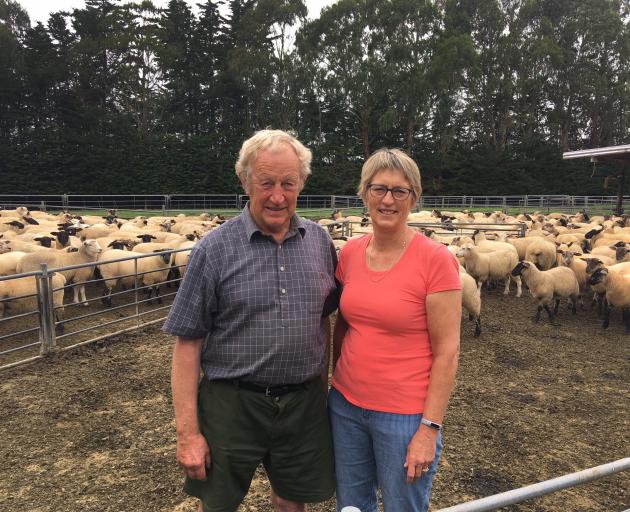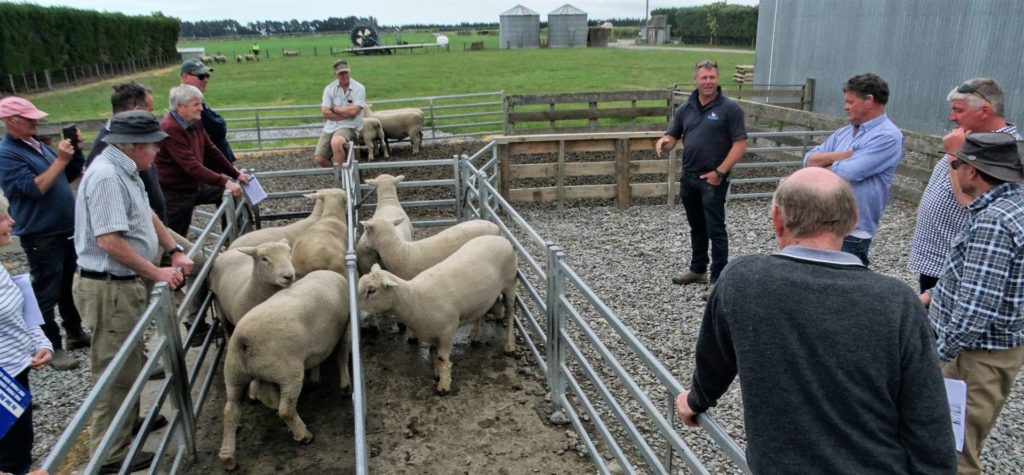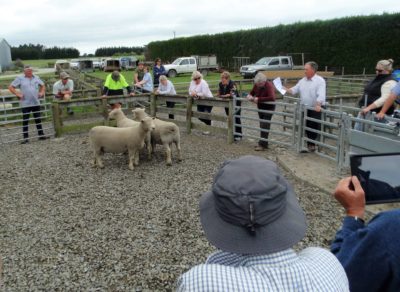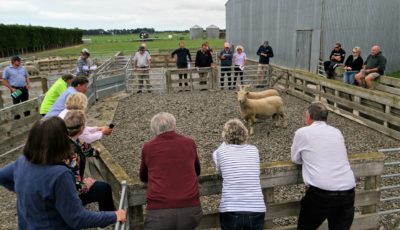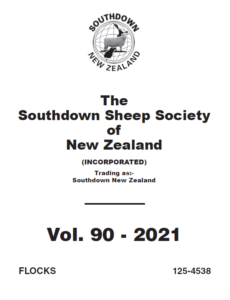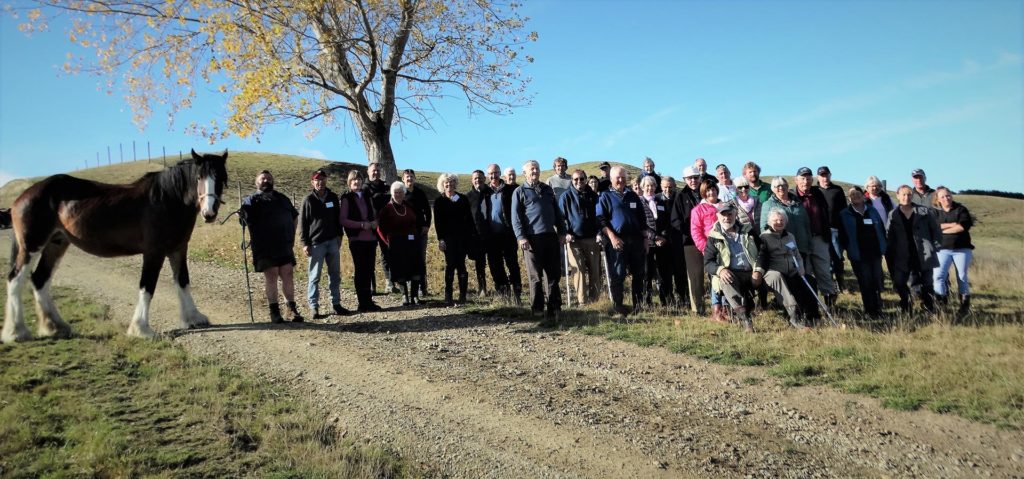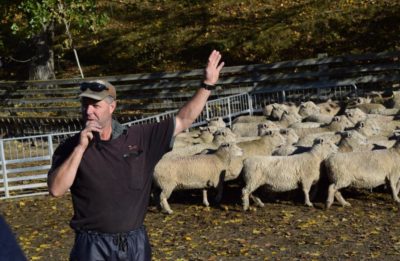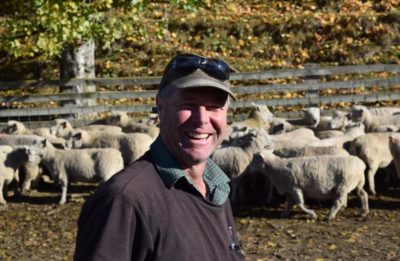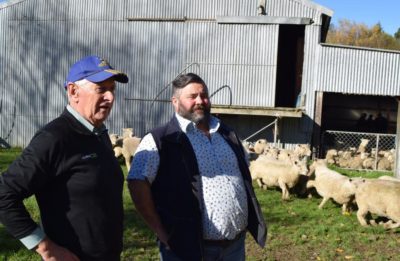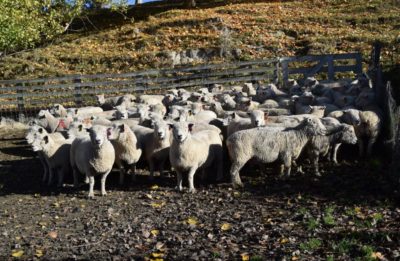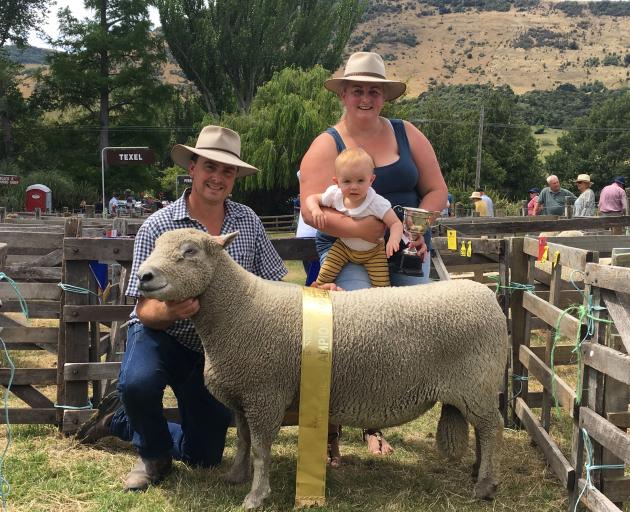The NZ Southdown Society Flock Book for 2022 has been published and non-members and interested visitors can view it online here
Archive for the ‘Southdown News’ Category
Stud owners ready for a new chapter
[Story by Sally Rae]
For more than a century, the Punchbowl name has been synonymous with stud sheep breeding in North Otago.
But a new chapter is looming for its current owners, Doug and Jeannie Brown, who are holding ewe dispersal sales in Oamaru this month.
It was Mr Brown’s grandfather Henry (HJ) Andrew — a legendary figure in the stud sheep industry — who came to Punchbowl, near Maheno, in 1915 after graduating from Lincoln College.
Originally from the Leeston area, he shifted south with his parents and began breeding Southdowns. Over time, his Southdown stud became very prominent at a time when Southdowns were the main terminal sire breed in New Zealand. He exported sheep to many parts of the world and also imported sires.
In his later years, he held a very successful annual sale at the North Otago A&P showgrounds before dispersing the Southdowns in 1978. He had also established a Poll Dorset stud in 1970.
After his death in 1985, the Punchbowl property was run as an estate until 1989 when Doug and Jeannie Brown bought it.
The Poll Dorset stud was re-established while a Suffolk stud, established in 1977 by Doug and his brother Andrew, was transferred to Punchbowl.
Numbers were built up through the 1990s to give more selection pressure and, in 2000, Texel sires were purchased to establish both the Suffolk-Texel and Poll Dorset-Texel studs. Stud ewe numbers peaked at 1300 in 2017 when just short of 2000 stud lambs were tagged.
About 150 Suffolk ewes and 400 Suffolk-Texel ewes will be on sale at the Waiareka saleyards, in Oamaru, on February 15, starting at 1pm, along with ewe lambs and stud sires.
The following week, on February 22, 80 Poll Dorset ewes and 500 Poll Dorset-Texel ewes will be offered, along with ewe lambs and stud sires.
Mr Brown, who acknowledged he was probably always destined
to be a farmer, said one of his farming highlights had been moving to Punchbowl.
He also recalled topping the trifecta of stud ram fairs in New Zealand — the North Island, Christchurch and Gore sales — for Suffolk rams one year.
There had been many changes in the industry over the years and, probably the biggest change for the Browns had been the move into cross-breeding.
The decline in sheep numbers, particularly in North Otago, had affected ram sales although they were now selling over a wider area, including clients in the Strath Taieri. Rams would still be available for sale next year.
Mr Brown has had a strong industry involvement, including with Federated Farmers, as a farmer-elected director of Alliance Group from 2001 to 2015 and as a long-serving Otago regional councillor, stepping down in 2019. It was probably winning the grand final of the Young Farmer of the Year contest in 1984 that gave him some profile which led to other opportunities, he said.
With the couple’s two children, Simon and Alice, not pursuing careers in farming, it was time to move on to the next chapter in their lives, they said.
Agents were reporting strong interest in the sales and it was a time where good lamb prices were being achieved, there was grass around and the outlook for sheepmeat was also strong, Mr Brown said.
Mrs Brown, who did not come from a farming background, had provided strong support. She also works part-time in Oamaru as a physiotherapist.
She laughingly recalled how her rural knowledge had a “watershed moment” back in 1996 when her husband headed overseas for a six-month Nuffield scholarship.
It was in the days before cellphones, she was at home with a 6-year-old and a 4-year-old, and the farm worker left.
Mr Brown travelled throughout Europe and the United Kingdom, looking at the meat industry, while his wife figured out how to fix leaking troughs and deal with problematic electric fences.
“I’m not sure what he learnt, I reckon I learnt more at home here,” she laughed.
Ian Jordan made a Member of the New Zealand Order of Merit
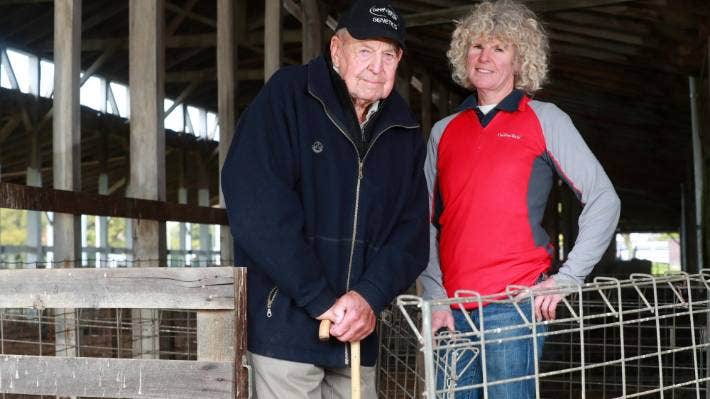
Ian Jordan, 94, with his daughter, Christina Jordan. Ian has been made a Member of the New Zealand Order of Merit for services to the livestock industry.
Ian Jordan has come a long way since paying 30 guineas for a stud ewe, and he’s hoping his legs can carry him a little further to enable him to collect his New Year Honours medal.
Blenheim-based Jordan is being made a Member of the New Zealand Order of Merit for services to the livestock industry.
Jordan, 94, is retired from farming duties, but he said he still liked to get involved.
“At 90-years-old I could still plough a paddock. I’m still interested in livestock.”
He is receiving the honour for contributing to sheep and cattle breeding in Marlborough, nationally and internationally.
His first and greatest passion in farming has been breeding Southdown sheep, he said, but his list of roles and achievement stretches far and wide.
Jordan is currently Honorary Judge for the Southdown breed and his Jersey cattle and Southdown sheep are regular exhibitors at Agricultural and Pastoral Shows – numerous trophies for his prize animals decorate his home.
But amongst all his achievements, he said one of the greatest memories of his career was seeing his son, Roger Jordan, place runner-up in a world ploughing contest.
“That was one of my highlights.”
Jordan has grown his expertise in sheep since he bought his first 10 stud ewes in 1956 for 30 guineas each.
These days, he exports Southdown, recently sending a ram to Uruguay and a cargo of the breed to north Japan with an enquiry for more to go to South America, he said.
“That’s how this developed, we’re one of the leaders in the Southdown in New Zealand now. That’s the one where I’ve made so much progress.”
Jordan was born with farming running through his veins and a family history in the industry in Blenheim where he still resides.
He said a lot had changed over the years, with the biggest shift being the transformation of land from grazing to vineyards.
“There is not as much livestock, but there’s still a lot of sheep grazing vineyards.”
With his legs not working the way they used to, Jordan said his children and grandchildren were following in his younger footsteps, taking on the responsibilities of livestock.
“We’ve always liked to keep good stock.”
As for the Order of Merit honour, he said was “surprised” and “very happy to accept it”.
“It’s keeping me wanting to live a bit longer. I want to be able to stand up just to get this medal in early May.”
Time to get out of the stud game after 50 years of sheep breeding
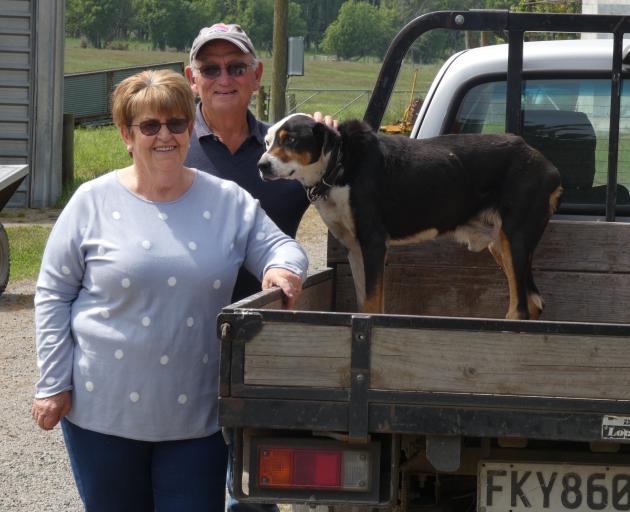
Cust farmers Colin and Liz Smith are holding a dispersal sale for their Bankhead dorset down stud after 50 years of sheep breeding.
Colin and Liz Smith have made the big call to exit stud breeding after 50 years.
A question from their stock agent Anthony Cox about whether they wanted to sell their Bankhead Dorset Down stud planted the seed.
They had talked about this before, but the difficult parting was never going to be a simple exercise. For a start, there’s a lot of history attached to number 46 in the stud book for the breed.
Colin Smith says the more they thought about it, the more they became convinced the time was right.
The crunch came at lambing time this year, he says.
Colin (74) had a ewe with twin lambs which were not drinking. After several hip and back operations, he struggled to get them on to the trailer and that made the decision easy for him.
“I thought this is hopeless and we can’t carry on like this, so that was the confirmation we had to do something. It would’ve been nice for someone to come in and buy the stud, but that was not meant to be and Coxy is very enthusiastic about this sale.”
So on January 21 they will bid farewell to the stud flock at a dispersal sale. Just over 90 mixed-age ewes, 23 two-tooth ewes and 38 ewe lambs will go under the hammer.
Colin’s father, Andrew, bought ewes from the Boyd-Clark family in Blenheim and registered the stud in 1964, after starting a southdown stud in the 1940s.
Colin can recall them as being big, upstanding animals, and marvelling at their ease-of-lambing in the early 1960s.
He says the Dorset Downs were virile animals, producing lambs with “get up and go”. They were bigger framed sheep then and produced larger lambs.
Equally, the Southdowns were renowned for producing twins and triplets.
Commercial clients would often buy two of each, to get more meat on their mainly Corriedale or Romney flocks, he says.
He was a late starter to sheep breeding as tractors were his first passion. When his brother moved to dairying, Colin slotted into this role in his 30s.
“I gradually came to like what I was doing by default. We ran Corriedale sheep plus the two studs — the Southdowns and the Dorset Downs. We put the Southdown over the Corriedale ewe and I kept the Corriedale flock going too of course. I got to quite enjoy the sheep.”
Romneys were later run at Bankhead as they found the first cross Romney-Corriedales were suited to the wetter ground. Romney rams were put over Corriedale ewes until 10 years ago when they phased this out.
Colin always felt the Southdown was better for producing fat lambs for the straight Corriedales and the Dorset Down for the Romney-Corriedales.
When his father died in 1972, Colin took over the studs and, eventually, put his own stamp on the sheep.
That was the year he and Liz got married. Both of her parents had been on farms and it was an easy transition moving from Christchurch to West Eyreton and later to Bankhead.
“The Dorsets I always thought were big, almost bad-tempered, and they were in that day, they were pretty fiery,” says Liz. “I was used to that as I had spent a lot of time on farms so it was no new thing really.”
Colin can remember struggling to keep the first ram hoggets in the yard, as they would just jump over the rails. Over the course of 50 years they’ve watched them transform into the sheep they are today.
Colin feels strongly that studs should be working first and foremost for commercial farmers.
He is proud of the many show ribbons they’ve won over the years, without losing sight of the fact that the animals need to perform on farms.
Whether in the showring or the salesyard, his competitive instincts pushed him to be the best he can. That stems from his rugby-playing days, when the Oxford senior side had three All Blacks.
“You are trying to breed the perfect sheep but you never do. There’s no perfect animal like there’s no perfect human being.”
Bankhead has been scaled down over the years with the Smiths only farming 110ha now, and a nephew leasing half of this.
A heritage home of seven bedrooms dating back to 1865 — first built by the Garlands — was burnt down in 2011.
Colin and Liz were in Akaroa at the time when the blaze ignited at 2am from recently-installed faulty wiring. Just about all their possessions, including stud records, were lost, and a new home has since been built.olin’s grandfather bought the property in 1911. His father took this on in 1947 after adding another dry land property on 160ha of flat land at West Eyreton in 1929, where sheep were mostly run.
Cows were milked at Bankhead until the year 2000 when a successful partnership of 25 years between Colin and his brother was dissolved.
The brothers basically swapped farms, with Colin and Liz moving to Bankhead. The first thing they did was convert it to a sheep farm when everyone else was moving in the opposite direction.
“It was very much [unusual], but it was such a practical way of dealing with the situation both families were in, really. I never liked milking cows anyway as in my school years I would be coerced to come over here for milking in the weekends and never enjoyed it.”
The Downs provided good sheep country and a 30ha block over the road was reserved for beef cattle. Colin continued the Southdown stud until 2007, when it became obvious that the farm wasn’t large enough to run two studs successfully.
“Southdowns were popular at that stage and they still are, and it seemed the natural thing to do just to keep one of the studs for management’s sake and for commercial sense really. The commercial flock was bringing in the money and we cut the studs back a bit so we could send more lambs to the works.”
About 150 ewes and older rams were sold on the day. This genetic base had produced champion rams and ewes at the Canterbury A&P Show through the late 1990s to the early 2000s.
Colin’s perhaps most proud of working to improve the hindquarters of his Dorset Downs.
“The Southdown always had good hindquarters and they were renowned for that, and when we sold the Southdowns I wanted to reach that with my Dorset Downs. I think we’ve come some way to doing that and improve that in that area in tune with what the market requires now. They’re as good a meat breed terminal sire as you can get.”
When they first started they were fortunate to reach a lambing percentage of 110%, and now it’s at 140% for the stud flock.
A Dorset Down ram made the record price of $17,500 in 2019 at the combined Gums and Bankhead Ram Sale with the Stevensons. Sadly, the sire died suddenly and even though they’ve had their own similar stories, that still doesn’t sit well with them.
The Dorset Downs have won their fair share of ribbons too and more lately — the Smiths won the silverware for the best meat breed ewe hogget and champion Dorset Down ram at the Ellesmere A&P Show.
So they’re leaving on good terms, knowing their stud sheep are at their best.
Without family to carry on the stud it’s an easy decision. Their son is a professor of agricultural economics at the University of California, Davis in the United States, and their three daughters have moved in different directions.
Colin says they’re happy they followed their passion. That said, they hope a future Smith will take on Bankhead to carry on the family legacy when they’re ready to move on.
Liz says they’re not sure what’s ahead of them, but one door always opens when another shuts.
She says it’s time to stop with Colin reaching 75 next year.
“That’s the thing: you either pull the pin and have a life or just keep going. I think if you’re wise you keep notice of these things.”
On one level, Colin’s happy to see the genetics being passed on to other farmers to keep the breed going.
“The fact of the matter is I have to face facts and can’t keep going like this. It’s going to happen this year, five years or whatever. So why not now while our stud’s in a good a position it has even been?”
[Story by Tim Cronshaw]
Chisholm getting a real buzz out of breeding Southdown sheep
[Story by Sally Rae]
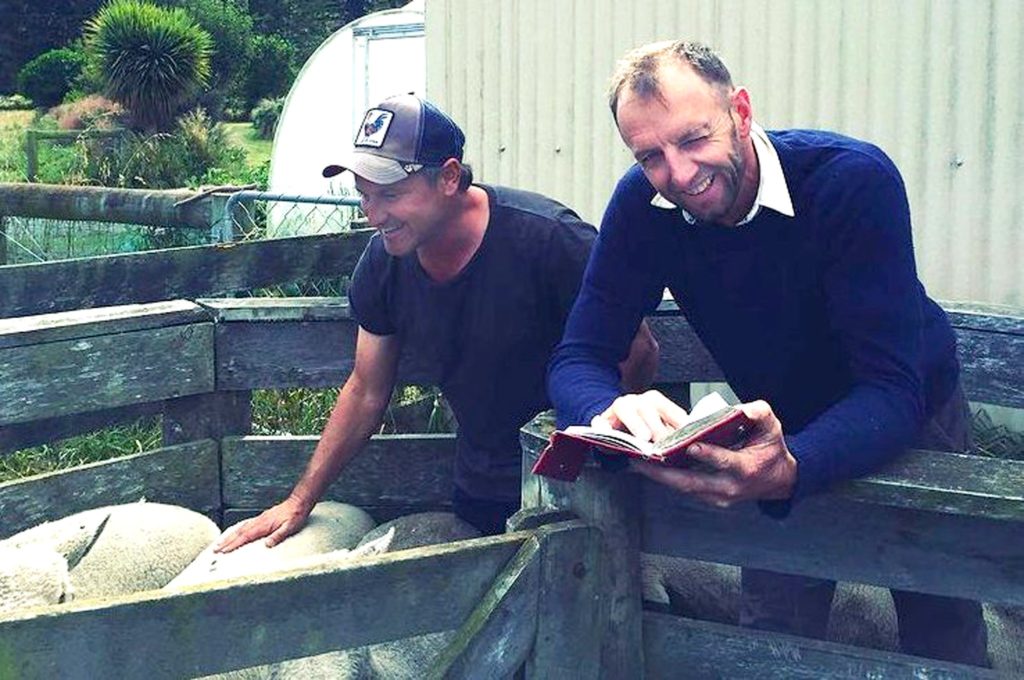
Southdown breeders Matt Chisholm (left), of Omakau, and Dave Robertson, of Oamaru, discuss the attributes of the breed.
Matt Chisholm is the new ram on the block in the world of stud sheep breeding – and he could not be happier.
On Monday, Chisholm – a familiar face on television and an advocate for mental health, having publicly opened up about his struggles with depression – will head to North Otago to sell a ram from his newly established Southdown stud The Land.
The Cordyline Southdowns ram fair will be like no other, held in the grounds of Brookfield Park, a Heritage New Zealand category 2 listed property which featured in the New Zealand House and Garden tour in 2019.
Built on the outskirts of Oamaru by renowned local architect Thomas Forrester for original owner John Gilchrist, the first mayor of Oamaru, it is now owned by Jennifer (JJ) Rendell, who since buying the property in 2003 has created an imaginative garden retreat surrounding a restored Victorian homestead.
Cordyline Southdowns, owned by North Otago couple Dave and Abby Robertson, will offer about 40 rams. There are also six entries from John and Margaret Macaulay’s Tahrua stud in South Canterbury, and Chisholm’s solitary offering of a ram he has dubbed Blair, after prominent Southdown breeder Blair Robertson.
“I’m not sure if it’s an exciting day for … Blair, he doesn’t really know what’s coming. It’s a hell of an exciting day for me because I’m going to market and really going to test where we’re at,” Chisholm said.
Chisholm, who grew up in Milton and Oamaru, had had a longtime interest in livestock and said it was now a privilege to be part of the stud breeding world.
“I was always going to be some kind of farmer, in inverted commas. I was always going to come back to some small amount of land. I couldn’t shake it, as much as I tried. I couldn’t get away from it,” he said.
During the latter stages of living in Auckland, when he was battling with since much-publicised depression, he would “get on Google and research up the wazoo”.
He had always liked the look of Southdown sheep and, after reading their story, fell in love with the old pure breed which had “stood the test of time”.
The Southdown is the oldest of the terminal sire breeds in the United Kingdom, and originates from the native sheep which have roamed the South Downs in the South of England for many hundreds of years. It was developed into a fixed type in the 18th century.
Chisholm had discovered the breed was “making a real comeback”, particularly for hogget mating, and he also had less-commercial reasons for wanting them in his paddock.
“For me, it’s basically about looking after myself and my mental health. I just want to walk around them and feel good about looking at good animals. They’re really commercially viable, it’s ticking all my boxes,” he said.
Chisholm and his wife Ellen are living in Omakau with their two young sons Bede and Finn, and baby daughter Bree who arrived in early October. They are building a house on their 29ha block of land at Chatto Creek, in the heart of rural Central Otago.
Chisholm founded his stud with the purchase of six ewes from Blair and Sally Robertson’s Merrydowns stud and five ewes from the Cordyline stud. When his first ewes arrived, it was “like a midwinter Christmas” for him.
Admitting to having an obsessive nature, no longer was he going to bed thinking about what the biggest current affairs story he could tell was. Instead he was thinking about lambing percentages and the likes.
“It’s quite mad,” he said.
“Blair” the ram was the progeny of an in-lamb ewe bought from Merrydowns.
“It’s a bit unfair because I didn’t breed him. It’s got my ear tag in it, really its a Merrydowns sheep,” Chisholm said.
Originally he had planned to breed from “Blair” but he later decided to sell the ram and purchase some new blood.
Next year, he might have about 50 ewes to the ram and, in a couple of years, he reckoned he might have 15-20 rams to sell.
“All I really want to do is just do something that I love. If I can sell a couple of rams a year to real red-blooded legitimate farmers, I’ll be chuffed.”
Chisholm acknowledged he had never been happier, even if it did mean he spent “far too much time” moving a couple of rams from paddock to paddock.
He felt very grateful that he had got to a position in life where he could make a certain amount of money doing the things he needed to do, which then opened up time to hang out with his family, and his land, “and have great conversations with good buggers”.
As his “serious work” was winding down for the year, Chisholm headed to West Otago on Tuesday this week for the Merrydowns ram sale, which offered both Southdowns and Romneys.
He was already familiar with some Southdown breeders — he did a talk during a Southdown Sheep Society’s southern tour earlier in the year, and he played rugby for Lawrence with the society’s president Don Murray many years ago.
Farmers were great; they liked that he was into sheep and wanted to know why, he said. They were also great at explaining things to him and he reckoned he quadrupled his knowledge in an afternoon.
Over several cans of Coke — Chisholm has been sober for more than a decade — he talked to “a lot of good buggers”— “mixing with my clan”, as he put it — and, as he drove away, he realised that was why he had “come home”.
Chisholm was delighted to be taking part in the Cordyline sale, saying Dave Robertson had “all the knowledge”, produced really good sheep and it was being held in a great location.
“I feel just bloody chuffed that he’s not laughed me out of the province and he’s invited me along.”
Veteran Southdown breeder John Macaulay was going to “bust out” his saxophone at the sale.
Dave Robertson quipped the ram sale could be “almost like a wedding”.
“I don’t know what it’s going to be.”
The motto was it was the latest version of an enduring breed.
“I can’t take any absolute credit for the stock I have, a whole lineage of Southdown breeders come before me,” he said.
It was important to keep purebred sheep “going forward” and he liked having both new breeders, such as Chisholm, and older, established breeders such as Mr Macaulay who had been involved in the Southdown breed since 1961.
For Mr Robertson, his aim was to continually try to breed better sheep while also trying to be more inclusive with other breeders.
“We need to work together to breed better sheep.
“I’ve always just tried to have an enjoyable atmosphere for myself, family and friends and ram clients. We’ve just got to keep it real. The other theme is farmers are real people, they’ve got real problems.
“[We’re] just trying to eat some genuinely good meat and see some genuinely good stock and keep everything in real time.”
Central Southdown Breeders Club Day
Recently a successful Central Southdown Breeders Club day was held at the home of the Mapua Stud, Andrew and Louise Christey at Southbridge.
The aim was for breeders to bring their ram hoggets, that are entered in the Canterbury Ram Fair, or their own on farm sales that have the potential to be stud sires to be seen by everyone.
There were 38 rams on display, from Blenheim in the North, to Oamaru in the South, and about 40 people, including our New Zealand President, ( judging at the Canterbury A & P Sheep Event the following day) with a number of Stud stock agents also attending.
A fantastic lunch was provided by the Club.
Thanks go to Andrew and Louise for a great day.
New Flockbook & Member Directory
The 2021 NZ Southdown Society Flockbook (Volume 90) is now available to be viewed and/or downloaded on our Flockbooks page
We have also made all the breeders contact details available, so if you ate looking to source flock rams you can probably find a breeder in your area. These can be found uder the contact section in the navigation menu above or by visiting the ‘Contact the Breeders‘ page.
Farmers discuss the benefits of Southdowns on Southern Tour
Tour Report courtesy ODT Rural News – Article and photos below by Shawn McAvinue
- Riverside stud owner Don Murray, of Waitahuna, speaks about his farm on a stop of the Southdown Sheep Society of New Zealand’s national southern tour last week.
- Riverside stud owner and President of the NZ Southdown Society Don Murray, of Waitahuna.
- Southern Southdown Breeders Club member Roger Keach (left), of Waihola, and chairman Rob Hall, of Waikaka, inspect a flock of Southdown sheep on Riverside stud last week.
- A flock of Southdown sheep at Riverside stud last week.
A tour of Southern farms running Southdown sheep featured discussions about hogget lambing and the traits of the breed farmers must “protect at all costs”.
About 40 people from throughout the country attended the Southdown Sheep Society of New Zealand’s national southern tour last week.
Tour stops included Don Murray’s Riverside stud in Waitahuna, about 10km southeast of Lawrence. Southern Southdown Breeders Club member Roger Keach, of Waihola, started proceedings by quizzing the visitors.
“Who played at two test matches — All Blacks and New Zealand Kiwis — on the same day in Auckland in 1946?” Visitors pondered the question as Mr Murray introduced himself and talked about his system breeding Southdowns on his 550ha farm.
He talked about lambing Southdown hoggets.
“I don’t like skiting but I reckon I’ve just about nutted this hogget lambing — it’s not without its fish-hooks but lambing late seems to help with survival and lambing problems,” Mr Murray said.
He had sold “quite a few lambs for hogget mating” and it had been “working really good” for his clients.
A client in the district had success on his first attempt at hogget lambing.
“Out of 180 lambs, he got 150 on the truck at 17.5kg, so if we can aim to do that, you’re starting to make some real money.”
When he started hogget lambing it was a “balls- up”.
“You’d have a good hogget and you’d pull the lamb out and it would wander away and be buggered but now our sheep have improved and I’ve become a bit of a convert.” Most of the improvements were due to providing quality feed to the hoggets.
“You can blame the ram all you like but if that hogget’s not there … ”
His system included lambing in mid-September and spreading fertiliser in November, in a bid to fatten the lambs and get them to the meatworks sooner.
“That seems to be working pretty good.” The Southdown traits he believed farmers should “protect at all costs” was its ability to mature early, thrive in tough weather conditions, the uniformity of the breed and its ease of lambing.
The first trait he looked for when selecting a ewe lamb was the condition of its feet and its ability to “stand up tall and strong”.
The second trait was its “head cover”, he said.
A topic of discussion was how much wool to remove from the head of a Southdown and when to do it to give it the best chance of survival.
A North Canterbury farmer on the tour said the first trait he looked for when selecting for improvements was the ability of a ewe to produce milk for her lambs.
Consequently, recording weaning weights was important to make future ewe selection decisions, he said.
Another topic Mr Murray raised for discussion was whether switching from conventional tagging to DNA tagging could increase lambing per centages.
If a twin or a triplet lamb was tagged conventionally, it could result in its mother abandoning it and impacting on survival rates.
“The ewes are doing better as I’m [conventional] tagging, but I am thinking quite seriously of doing DNA tagging.”
The only part of DNA tagging which “scares” him was upsetting any long-term clients by switching tagging method. “That makes me nervous,” Mr Murray said.
Club member John Macaulay, of Timaru, said he had been breeding Southdown sheep for more than 60 years and was on a tour of Riverside stud nine years ago.
“In those nine years you’ve improved out of sight, no doubt. You have some magnificent ewes.”
Other tour stops included the Lammermoor Stud in the Maniototo, Merrydowns stud in Waikoikoi, Lilliesleaf Stud in Waikaka, Aniwaniwa Stud in Pomahaka, Otepuni Stud in Invercargill and Mt Annan Stud in Waikoikoi.
The answer to Mr Keach’s brainteaser: the Mount Roskill Brass Band.
Southdown ram takes top prize at Little River
North Canterbury sheep genetics came out on top at Little River last month.
John and Stacey Burrows of Burrows Genetics, from Oxford, won supreme champion sheep at the Banks Peninsula A&P Show on Saturday, January 23, with a six-tooth Southdown ram.
“We won it in 2017 at Little River with a Dorset Down ram. We like coming over here. It’s a good little show and very well run,” Mr Burrows said.
The champion ram was bought from Lincoln farmer Brent Macaulay, and the ram’s daughter, a two-tooth Southdown ewe, claimed all breeds champion ewe.
One of Mr Burrow’s Dorset Downs also won all breeds champion ram lamb, to cap off a good start to the New Year.
“It makes the early start worth it,” Mrs Burrows said.
The Burrows family entered 21 sheep to help boost sheep entry numbers to 190.
“The entries closed before Christmas and they were slow coming in, so [show junior vice-president] Ben Butterick put out a message saying ‘we’ve got no entries’, so we made sure we had a good team,” Mr Burrows said.
The Burrows have 100 Southdown, 100 Dorset Down and 30 Suffolk stud ewes.
“I’ve had a good run with the Dorset Downs and when I got together with Stacey, she decided we needed some Southdowns as well, so they’re her thing really .
“I’m a stickler for the Dorset Downs really, but they’ve all got their attributes. The Southdowns, we sell a lot of them for hogget mating and they’re going really well.
“We’ve got a sheep conveyor business and a lot of places we go to use Suffolks,” he said.
The Suffolk stud has been established for the couple’s 13-month-old daughter Holly.
Stud sheep are in Mr Burrow’s blood, as his father Tom Burrows, the New Zealand Sheepbreeders’ Association president, has been breeding sheep since the 1970s, and his great-uncle Tug Burrows was a well-known Corriedale breeder.
Mr Burrows was pleased to be back to showing sheep and catching up with farmers, after some shows were cancelled last year due to Covid-19.
“We’ve got a year to catch up on now and have a look at everyone else’s sheep. We were at home looking at our sheep the whole time.”
Sheep convener Dave Butterick was pleased with the response, after an uncertain year.
While entries were down compared to last January, there was no feature breed this time, which tended to boost entries.
“Last year was one to forget, so it’s just good to get back to having some shows.”
Southdown sheep entries were strong, while the black and coloured sheep classes were well-supported and there were good numbers of Poll Dorsets and Suffolks, he said.
Charlee and Ellavetta steal the show
Charlee Hazlett and Ellavetta are not your usual pair of best friends.
One is a 5-year-old girl, and the other is a Southdown sheep.
But nothing will stand in the way of the bond these two share.
The pair were glued at the hip as they wandered through the Palmerston Waihemo A&P Show — where Ellavetta won first prize in the large pet section — on Saturday.
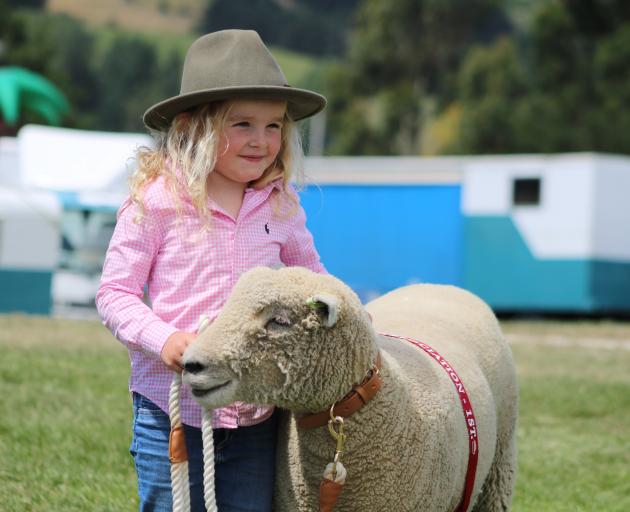
Charlee Hazlett, of Hokonui, won best large pet with her Southdown sheep Ellavetta at the Palmerston Waihemo A&P Show on Saturday. PHOTOS: KAYLA HODGE
Charlee was over the moon with her prized sheep’s victory, and said her favourite thing about her pet was the way “she follows me around”.
Her trick to getting Ellavetta into shape was simple.
“I just give her some nuts,” Charlee said.
They travelled from Hokonui to take part in the show, and would venture around other Otago and Southland A&P shows in the coming months.

